Keith Miller's Blog, page 6
June 25, 2012
Durrell Revival?
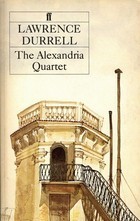
Peter Pomerantsev in Newsweek has an article on Lawrence Durrell, arguing that he's "the most important 20th-century novelist for a 21st-century reader." Is this the beginning of a Durrell revival? Hope so. Here's more:
"The city at the center of his masterpiece, The Alexandria Quartet, is the prototype of the global village, of the smudged meta-city we increasingly inhabit. Published between 1957 and 1960, the Quartet is a series of interlinked novels set in Alexandria preceding and during World War II, but it’s uncanny how its political disorder anticipates our own. The Alexandria of the Quartet is run with an ever-weaker hand by Western powers losing their will to rule, and is ever-more dominated by ambitious but corrupt emerging nations, influenced by deracinated tycoon financiers, stirred on the streets by Islamic “nightmare-mystics, shooting out the thunderbolts of hypnotic personality.” The state of Israel, off-stage but central to the plot, divides loyalties to the point of death and tragedy. The Quartet is an exceptional political thriller: imagine John Grisham rewritten by Joyce."
He concludes: "The world is finally catching up with Lawrence Durrell. We are all Alexandrians now."
Published on June 25, 2012 12:33
May 22, 2012
Tomatoes

Tomatoes
by Stephen Dobyns
A woman travels to Brazil for plastic
surgery and a face lift. She is sixty
and has the usual desire to stay pretty.
Once she is healed, she takes her new face
out on the streets of Rio. A young man
with a gun wants her money. Bang, she’s dead.
The body is shipped back to New York,
but in the morgue there is a mix-up. The son
is sent for. He is told that his mother
is one of these ten different women.
Each has been shot. Such is modern life.
He studies them all but couldn’t find her.
With her new face, she has become a stranger.
Maybe it’s this one, maybe it’s that one.
He looks at their breasts. Which ones nursed him?
He presses their hands to his cheek.
Which ones consoled him? He even tries
climbing into their laps to see which
feels the most familiar but the coroner stops him.
Well, says the coroner which is your mother?
They all are, says the young man, let me
take them as a package. The coroner hesitates,
then agrees. Actually, it solved a lot of problems.
The young man has the ten women shipped home.
then cremated them all together. You’ve seen
how some people have a little urn on their mantel?
The man has a huge silver garbage can.
In the spring, he drags the garbage can
out to the garden, and begins working the teeth,
the ash, the bits of bone into the soil.
Then he plants tomatoes. His mother loved tomatoes.
They grew straight from seed, so fast and big
that the young man is amazed. He takes the first
ten into the kitchen. In their roundness,
he sees his mother’s breasts. In their smoothness,
he finds the consoling touch of her hands.
Mother, mother, he cries and he flings himself
on the tomatoes. Forget about the knife, the fork,
the pinch of salt. Try to imagine the filial
starvation, think of the ravenous kisses.
Published on May 22, 2012 03:38
May 6, 2012
Karen Blixen: The Kenya-Wisconsin Connection

When I was growing up in Nairobi, the name of Karen Blixen naturally came up quite often. The neighborhood in what used to be her old farm, at the foot of the Ngong Hills, is to this day called Karen, and everyone, of course, had read Out of Africa (even before the movie came out). My violin teacher, Anna Martin, was the wife of Remy Martin, who had bought Blixen's farm. I read Out of Africa and Shadows in the Grass and her cook Kamante's memoir Longing for Darkness when I was twelve or thirteen, and enjoyed them (though they weren't nearly as evocative as Elspeth Huxley's The Flame Trees of Thika ). In 1982, Judith Thurman's wonderful biography, Isak Dinesen: Life of a Storyteller came out, and in 1985 the movie with Meryl Streep and Robert Redford, and suddenly she epitomized the romantic notion of Africa. Her house remains a massive tourist draw.
Partly because I was tepid on Out of Africa and partly because of her new fame, I ignored Blixen's other writings till I was in my twenties. Then I discovered Seven Gothic Tales on a bookshelf in Atbara, Sudan. What a revelation! "The Roads Round Pisa" and "The Monkey" are, in my opinion, the two finest, strangest stories ever written. I reread them every year - they're like a little holiday to an exotic country.
When we moved to Wisconsin a couple years ago, I remembered that Blixen's father, Wilhelm Dinesen, had lived in northern Wisconsin. He'd spent a year or so with the Chippewa, had a relationship with his cook, Nesuw-wge-zhicqo-quay (later "Kate"), fathered a daughter, Emma "Denson," by her, and contracted syphilis. His cabin has recently been restored, and is open to the public. You can see a picture of Joseph Ackley, Wilhelm Dinesen's great-grandson, and Blixen's ... what? half-grand-nephew? here. I think he looks a bit like her!
Published on May 06, 2012 06:45
April 17, 2012
Review of The Book on Fire
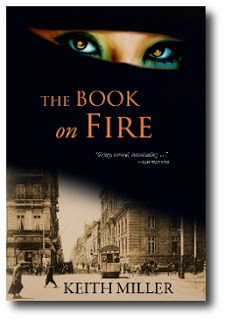
One of my favorite sites, the wonderfully named Biblioklept, has posted a nice review of The Book on Fire:
"Balthazar, the hero of Keith Miller’s agile and trippy novel The Book on Fire, is a biblioklept. He comes to Alexandria to rob the famous library, a cavernous, labyrinthine complex that still exists—under heavy guard—in Miller’s mystical version of that ancient Egyptian city. Miller’s Alexandria is a byzantine maze, humming with a turn-of-the-century buzz, a kaleidoscope world that strongly reminded me of the strange cityscapes of William Gibson or William Burroughs. . . .
"For Balthazar, books are a drug, and the Library of Alexandria is the heady nexus point for his addiction. . . . While The Book on Fire does have the strong, page turning plot of a thriller, that plot exists mostly as the bones for Miller to hang rapturous descriptions of reading and books and, best of all, his strange Alexandria, a city of marvels."
Published on April 17, 2012 07:05
April 13, 2012
March 31, 2012
With Ink the Ocean Fill
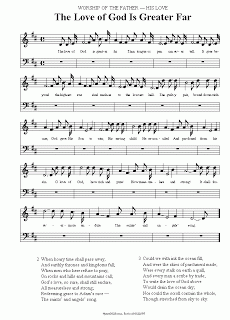
Last Sunday at our local Mennonite church, we sang "The Love of God," a hymn I've always enjoyed for the wonderful third verse, with its convoluted syntax:
Could we with ink the ocean fill, And were the skies of parchment made;Were every stalk on earth a quill, And every man a scribe by trade;To write the love of God above Would drain the ocean dry;Nor could the scroll contain the whole, Though stretched from sky to sky.
By a weird coincidence, I got an email from my dad the next day, commenting on the origins of the verse. He'd learned about it from my uncle, who goes to church with Jeremy Nafziger, a writer interested in church music. Here are Jeremy's comments (used with permission):
Frederick Lehman, the author and composer, sounds like he should be a Mennonite, but alas, he was a Nazarene minister. Early in his ministry (around 1900), he heard a preacher end his sermon with lines similar to the third verse of this hymn. The lines had been found scribbled on the wall of an insane asylum after the inmate's death; Lehman says that "the general opinion was that this inmate had written it in moments of sanity."
Lehman later used the words, slightly altered, years later as the third stanza of "The Love of God."
It turns out, however, that the lines from the asylum wall came from a long poem written in Aramaic in the 11th century by a Jewish rabbi in Worms, Germany. (Note—the author was Rabbi Ben Isaac Nehorai, in a poem called "Hadamut," written in 1050.)
And that may not even be the original—the Koran, written in Arabic four centuries earlier, contains this passage: "And were every tree that is in the earth (made into) pens and the sea (to supply it with ink), with seven more seas to increase it, the words of Allah would not come to an end; surely Allah is Mighty, Wise" (XXXI:27).
And you can go further back than that, to the Gospel of John, to find another similar passage. In the last verse of the book, we read: "Jesus did many other things as well. If every one of them were written down, I suppose that even the whole world would not have room for the books that would be written."
So in this one hymn, we see the story of all God's children signing the covenant that "shall forevermore endure."
Published on March 31, 2012 04:16
March 21, 2012
March 16, 2012
Book on Fire reviews

Couple nice reviews from Reading Envy and Beyond the Stacks:
Reading Envy
A book thief lands in a fantastical version of the legendary Alexandriato steal from his ultimate library, and falls in love with a librarian workingthere. I'm not sure if the author loves libraries or librarians more,considering that his previous book, The Book of Flying, was along similar lines, but I have to admit it works forme. I almost feel embarrassed to say how much I enjoyed reading this book, butI can't really explain why. I was already enamored with Alexandria afterreading the Durrell quartet, and this made it so much worse!
The writing is very descriptive, and I'm temptedto say overly so, except I don't feel it is. Most of the time if I pick up abook that spends half its time describing smells and food, it reads likefiller, but here it serves to place the reader into his vision of Alexandria. Ifound myself drawn in and living in the world as I read, which doesn't happenoften as an adult. (I also ended up hungry!)
There are elements of the writing and of thestorytelling that are the same elements I love in Catherynne Valente's writing,and anyone knows me knows that is high praise indeed. After reading a littlemore about the author himself, I feel like you can see glimpses of his reallife experiences tucked into this book, as far from reality as it seems.
Beyond the Stacks
There is a book out there for everyone. A book that speaks to your very soul, that can make you weep in utter heartache and cry tears of joy and amusement. For me, this is the book. This is my book. I found myself reading slower, rereading passages again and again, just to savor every last morsel from this exquisite feast of the imagination.
Published on March 16, 2012 06:21
February 25, 2012
Alcohol Drunk in Hemingway's Fiesta
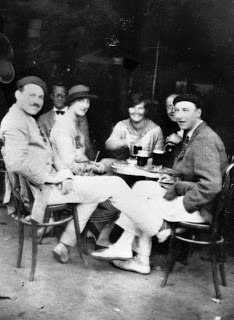
Above, l. to r.: Hemingway, Harold Loeb (model for Robert Cohn), Lady Duff Twysden (model for Lady Brett Ashley), Hadley Hemingway, Don Stewart, Pat Guthrie
The page numbers below are from the the Jonathan Cape edition of Fiesta (below), which was Hemingway's favorite. Fiesta was Hemingway's original title, much better than The Sun Also Rises, which was used in the States because his editors felt American readers wouldn't know what a fiesta was.
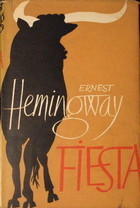
"several fines" - p. 6
"whisky and soda" - p. 11
"apertif" - p. 13
"pernod" - p. 14
"bottle of wine" - p. 16
"liquers" - p. 19
"beer" x2 - p. 20
"cognac" - p. 20
"fine a l'eau" - p. 21
"brandy and soda" - p. 33
"beer" - p. 38
"Jack Rose" - p. 42
champagne - pp. 61-63 (3 bottles)
"brandy" - p. 64
"pernod" - p. 75
"whisky and soda" x2 - p. 77
"fine" - p. 78
"another" - p. 85
"beer" - p. 92
"plenty of wine" p. 97
"bottle of wine" p. 101
"wine of the country" - p. 105
"wine-skin" - p. 107
"drinks" (4) - p. 109
"hot rum punch" - p. 114
"wine" (several bottles) - p. 114
"wine" (2 bottles) - p. 132
2 bottles wine - p. 132
"another bottle" - p. 133
"poisonous things" - p. 150
"much wine" - p. 151
"too much brandy" - p. 154
"vermouth" - p. 156
"sherry" - p. 158
"wineskins" - p. 162
"a drink" - p. 162
"absinthe" - p. 170
"fundador" (amontillado brandy) - p. 181
"fundador" - p. 186
"fundador" p. 188
"cognac" - p. 194
"fundador" - p. 197
"beer" (6 bottles) - p. 209
"beer" - p. 211
"beer" (6 bottles) - p. 212
"fundador" - p. 212
"beer" - p. 213
"another beer" - p. 213
"wine" - 219
"several bottles of beer" - p. 230
"absinthe" - p. 231
"another absinthe" - p. 231
"bottle of fundador" - p. 238
"whisky and soda" - p. 238
"whisky and soda" - p. 239
"another round" - p. 239
"another drink" - p. 239
"another drink" - p. 240
"bottle of wine" - p. 243
"vieux marc" - p. 243
"second marc" - p. 243
"whisky and soda" - p. 246
"two martinis" - p. 255
"two martinis" - p. 256
"two martinis" - p. 257
"rioja alta" (3 bottles) - p. 257
"rioja alta" (2 bottles) - p. 258 (Following this last spree, that starts on p. 255, during which Jake drinks six martinis and five bottles of wine, Brett tells him: "Don't get drunk.")
Published on February 25, 2012 04:42
February 2, 2012
Some Literary Humor
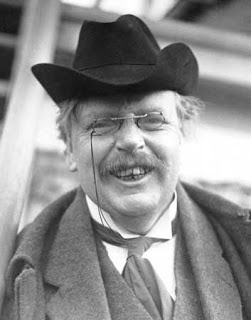
G.K. Chesterton (pictured) was an enormous man. A woman once asked him why he wasn't out at the Front. His reply: "If you go round to the side, you will see that I am." On another occasion, he told George Bernard Shaw: "To look at you, anyone would think there was a famine in England." Shaw's reply: "To look at you, anyone would think you caused it."
Oscar Wilde on George Bernard Shaw: "An excellent man: he has no enemies, but is intensely disliked by his friends."
"Meredith is a prose Browning, and so is Browning. He used poetry as a medium for writing in prose." — Oscar Wilde
"I love Americans, but not when they try to talk French. What a blessing it is that they never try to talk English." — Saki
"In Paris they just simply opened their eyes and stared when we spoke to them in French! We never did succeed in making those idiots understand their own language." — Mark Twain
"I was sorry to have my name mentioned as one of the great authors, because they have a sad habit of dying off. Chaucer is dead, Spencer is dead, so is Milton, so is Shakespeare, and I'm not feeling so well myself." — Mark Twain
"An Englishman wouldn't bother to attend a reading even if the author in question was his favorite living writer, and also his long-lost brother — even if the reading was taking place next door." — Martin Amis
Headline of a review of Exit Ghost by Philip Roth: "Do Not Go Gentile into That Good Night."
My wife, on finding I'd eaten all the Doritos: "Is this the face that munched a thousand chips?"
Published on February 02, 2012 15:03



